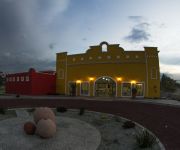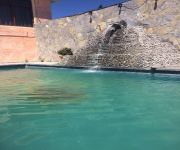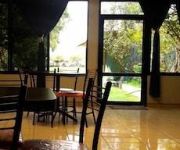Safety Score: 3,6 of 5.0 based on data from 9 authorites. Meaning please reconsider your need to travel to Mexico.
Travel warnings are updated daily. Source: Travel Warning Mexico. Last Update: 2024-08-13 08:21:03
Touring Pilares
The district Pilares of in Estado de México is a subburb located in Mexico about 20 mi north-east of Mexico City, the country's capital place.
Need some hints on where to stay? We compiled a list of available hotels close to the map centre further down the page.
Being here already, you might want to pay a visit to some of the following locations: Tezoyuca, Papalotla, Teotihuacan, Tepetlaoxtoc and Texcoco. To further explore this place, just scroll down and browse the available info.
Local weather forecast
Todays Local Weather Conditions & Forecast: 19°C / 66 °F
| Morning Temperature | 9°C / 47 °F |
| Evening Temperature | 17°C / 62 °F |
| Night Temperature | 11°C / 53 °F |
| Chance of rainfall | 0% |
| Air Humidity | 15% |
| Air Pressure | 1019 hPa |
| Wind Speed | Gentle Breeze with 8 km/h (5 mph) from South |
| Cloud Conditions | Clear sky, covering 1% of sky |
| General Conditions | Sky is clear |
Tuesday, 26th of November 2024
20°C (67 °F)
10°C (51 °F)
Sky is clear, moderate breeze, clear sky.
Wednesday, 27th of November 2024
20°C (69 °F)
15°C (58 °F)
Sky is clear, gentle breeze, clear sky.
Thursday, 28th of November 2024
22°C (72 °F)
16°C (60 °F)
Sky is clear, gentle breeze, clear sky.
Hotels and Places to Stay
Hotel Teotihuacan
Hotel Teoticamp
Villas Arqueologicas Teotihuacan
Hotel Boutique El Jaguar
Hotel Quetzalcalli
Telpochcalli Hotel & Temazcal
Posada Jade Teotihuacán
Videos from this area
These are videos related to the place based on their proximity to this place.
AHO a.k.a. ITAL @ Zelebra Festival 2013 By Play Label MEXICO
06-Oct-2013 16:45 hrs. @Ex Hacienda San Antonio (Xometla, Acolman, México) Excelente la calidad musical del evento y lo mejor de todo SIN CHAKAS (bueno, al menos una mínima cantidad). ...
Tutorial Aprende a doblar una camisa, Alumno de Educación Especial
En este Video tutorial aprenderemos como doblar una prenda de vestir, en especifico una camisa.
BURNOUT PARADISE CITY DESPEJANDO EL CAMINO #2
HELLO BUENO ESPERO LES GUSTE ESTE VIDEO DE BURNOUT PARADISE CITY... TAMBIEN LES INFORMO QUE VOY A EMPEZAR A SUBIR MAS VIDEOS DURANTE ESTAS SEMANAS ....
Presentacion canal TehJoseManuArx15
Redes Sociales Facebook: https://www.facebook.com/profile.php?id=100006796451843&fref=ts Twitter: https://twitter.com/joselanz155 Canal Principal: http://www...
GRUPO DE DANZA ¡¡ME-XHI-CO!!. TEZOYUCA, MÉXICO.
Sinopsis videográfica de algunos de las piezas dancísticas que forman parte del repertorio del Grupo de Danza ¡¡Me-Xhi-Co!! de Tezoyuca, Estado de México.
Videos provided by Youtube are under the copyright of their owners.
Attractions and noteworthy things
Distances are based on the centre of the city/town and sightseeing location. This list contains brief abstracts about monuments, holiday activities, national parcs, museums, organisations and more from the area as well as interesting facts about the region itself. Where available, you'll find the corresponding homepage. Otherwise the related wikipedia article.
Teotihuacan
Teotihuacan, also written Teotihuacán, is an enormous archaeological site in the Basin of Mexico, 30 miles northeast of Mexico City, containing some of the largest Mesoamerican pyramids built in the pre-Columbian Americas. The name means "where man met the gods. " Apart from the pyramids, Teotihuacan is also known for its large residential complexes, the Avenue of the Dead, and numerous colorful, well-preserved murals.
Texcoco (altepetl)
Texcoco was a major Acolhua city-state in the central Mexican plateau region of Mesoamerica during the Late Postclassic period of pre-Columbian Mesoamerican chronology. It was situated on the eastern bank of Lake Texcoco in the Valley of Mexico, to the northeast of the Aztec capital, Tenochtitlan. The site of pre-Columbian Texcoco is now subsumed by the modern Mexican municipio of Texcoco and its major settlement, the city formally known as Texcoco de Mora.
Ecatepec de Morelos
Ecatepec, once officially San Cristóbal Ecatepec de Morelos, is a city in the State of Mexico and the seat of Ecatepec de Morelos Municipality; however, both the city and the municipality are often known simply as "Ecatepec". The name "Ecatepec" is derived from Nahuatl, and means "windy hill" or "hill devoted to Ehecatl". It was also an alternative name or invocation to Quetzalcoatl. "Morelos" is the last name of José María Morelos, a hero of the Mexican War of Independence.
Pyramid of the Moon
The Pyramid of the Moon is the second largest pyramid in Teotihuacan, Mexico after the Pyramid of the Sun. It is located in the western part of Teotihuacan and mimics the contours of the mountain Cerro Gordo, just north of the site. Some have called it Tenan, which in Nahuatl, means "mother or protective stone. " The Pyramid of the Moon covers a structure older than the Pyramid of the Sun which existed prior to 200 AD.
Chapingo, State of Mexico
Chapingo is a small town located on the outskirts of the city of Texcoco, Mexico State in central Mexico. It is located at {{#invoke:Coordinates|coord}}{{#coordinates:19|29|N|98|53|W||| | |name= }}, about 25 km west of Mexico City International Airport. Chapingo is most notable as the location of Chapingo Autonomous University (Universidad Autónoma Chapingo). The UACh, as it is known, is the country's most prestigious center for agricultural studies.
Temple of the Feathered Serpent, Teotihuacan
The Temple of the Feathered Serpent is the modern-day name for the third largest pyramid at Teotihuacan, a pre-Columbian site in central Mexico. This structure is notable partly due to the discovery in the 1980s of more than a hundred possibly-sacrificial victims found buried beneath the structure. The burials, like the structure, are dated to some time between 150 and 200 CE. The pyramid takes its name from representations of the Mesoamerican "feathered serpent" deity which covered its sides.
Pyramid of the Sun
The Pyramid of the Sun is the largest building in Teotihuacan and one of the largest in Mesoamerica. Found along the Avenue of the Dead, in between the Pyramid of the Moon and the Ciudadela, and in the shadow of the massive mountain Cerro Gordo, the pyramid is part of a large complex in the heart of the city.
San Salvador Atenco
San Salvador Atenco is the municipal seat of Atenco, in the Mexican state of Mexico. The name "Atenco" comes from a Nahuatl phrase meaning "place on the edge of water".
Tepexpan, State of Mexico
Tepexpan is the largest town in the Acolman municipality in the State of Mexico, Mexico. The population was 48,103 as of the 2005 Mexican census. One of the most interesting aspects of this town is the discovery of an early Mesoamerican skeleton commonly referred to as "Tepexpan man". Recent research tries to show that the skeleton was not that of a man but that of a woman. The woman was apparently trampled by a raging mastodon around 11,000 BCE.
Chiconcuac de Juárez
Chiconcuac de Juárez, typically referred to simply as Chiconcuac, is a town and municipio in the state of Mexico, approximately 10 kilometers north of Texcoco de Mora. The name Chiconcuac derives from the Aztec word Chicome Coatl, “Seven snakes”, which was a date on the Aztec calendar.
Metro Plaza Aragón
Plaza Aragón is a surface station on Line B of the Mexico City Metro system. The station was opened on 30 November 2000. It is located in the median of Avenida Carlos Hank González in the Colonia Rinconada de Aragón neighborhood in the State of Mexico adjacent to Mexico City. The station logo depicts pots for sale at a tianguis style open air market.
Metro Ciudad Azteca
Ciudad Azteca (English: Aztec City) is a surface terminal station on Line B of the Mexico City Metro system. It is located in the median of Avenida Carlos Hank González in the Colonia Ciudad Azteca neighborhood of Ecatepec de Morelos in the State of Mexico adjacent to Mexico City. It offers connections to the Terminal Multimodal Azteca Bicentenario bus station. The logo represents a hieroglyph typical of the Aztec city of Tenochtitlán. The station was opened on 30 November 2000.
Tepetlaoztoc
Tepetlaoztoc or Tepetlaoxtoc is an archaeological site located in the Central Mexico plateau region of Mesoamerica, which was formerly an Aztec/Nahua settlement during the Late Postclassic period of Mesoamerican chronology, with an occupancy continuing through the Colonial period. The site is situated in the Valley of Mexico, to the northeast of Texcoco.
Texcoco, State of Mexico
Texcoco is a city and municipality located in the State of Mexico, 25 km northeast of Mexico City. In the pre-Hispanic era, this was a major Aztec city on the shores of Lake Texcoco. After the Conquest, the city was initially the second most important after Mexico City, but its importance faded over time, becoming more rural in character.
Otumba de Gómez Farías
Otumba or Otumba de Gómez Farías is a town and municipality located in the northeast of the State of Mexico, just northeast of Mexico City. Historically, this area is best known as the site of the Battle of Otumba and as an important crossroads during the colonial period where incoming viceroys ceremoniously were handed power by their predecessors. Today, it is a rural municipality undergoing changes as urbanization arrives here from the Mexico City area.
Tequexquinahuac
Tequexquinahuac belongs to the municipality of Tlalnepantla de Baz in the State of Mexico, Mexico. Tequexquinahuac is a neighborhood of approximately 2,000 inhabitants that is situated in the metropolitan zone of Mexico City, to the north of the delegacion (borough)of Azcapotzalco. Tequexquinahuac has changed from a common town to being an important region between Cuautitlan Izcalli (one of the most important industrialized municipalities in the state of Mexico) and Mexico City.
Ojo de Agua, State of Mexico
Ojo de Agua is the largest town in the municipality of Tecámac in Mexico State, Mexico. It is located in the northeastern part of the state, northeast of the Federal District (Distrito Federal) and within the Greater Mexico City urban area. It had a 2010 census population of 242,272 inhabitants, or 66.45 percent of its municipality's total of 364,579. Ojo de Agua is the largest locality in Mexico that is not a municipal seat.
Coatlinchan
Coatlinchan is a town in the Mexican state of Mexico. A colossal statue over a thousand years old that was thought to represent Tlaloc was found in the town of Coatlinchan Mexico. This statue was made of Basalt and weighed an estimated 168 tons. It was moved to the National Museum of Anthropology in Mexico City in 1964 on a special trailer with dozens of rubber tires. This didn't happen until they promised the residents of the town to provide a large amount of public works.
San Bernardo Tlamimilolpan
San Bernardo Tlamimilolpan is a village in the state of Mexico, Mexico.
San Bernardino, State of Mexico
San Bernardino is a village in the State of Mexico, Mexico.
Paleontological Museum in Tocuila
The Paleontological Museum in Tocuila (Museo Paleontológico en Tocuila) displays part of one of the richest deposits of Late Pleistocene fauna in America. International groups of archeologists discovered a large quantity of bones, mainly mammoth remains, estimated to be 11,000 to 12,000 years old, in an ancient river mouth that used to flow into the Lake Texcoco.
Chapingo Autonomous University
Universidad Autónoma Chapingo (Chapingo Autonomous University) is an agricultural college located in Texcoco, Mexico State in Mexico. The university is a federally funded public institution of higher education. It offers technical and full bachelor’s degrees as well as having scientific and technological research programs. Many of these programs are related to agriculture, forestry and fishing.
El Caracol, Ecatepec
The Deposito de Evaporación Solar "El Caracol" (also known as El Caracol de Texcoco or "El Caracol de la Ciudad de México) is a spiral-shaped land formation located to the northeast of Mexico City, in the municipio of Ecatepec de Morelos, Mexico. This Giant Spiral is located next to Central Avenue, near from the "Las Americas" Shopping Mall & Residential zone. It was formed by the sediment of the Lago de Texcoco.
Santa Isabel Ixtapan
Santa Isabel Ixtapan is a community which is part of the municipality of San Salvador Atenco in the State of Mexico, Mexico. It has 4,125 inhabitants and lies 2,240 meters above sea level. The area is known for having one of the largest and best-studied mammoth kill sites in the Valley of Mexico.
Molino de Flores Nezahualcóyotl National Park
Molino de Flores Nezahualcóyotl National Park, which used to be the Hacienda Molino de Flores, is located in the Municipality of Texcoco in the State of Mexico and used to produce pulque and grains. Most of the buildings on the site, such as the main house, the church of San Joaquin and the Chapel of Señor de la Presa (Lord of the Dam), were constructed by Miguel de Cervantes and his wife.




















